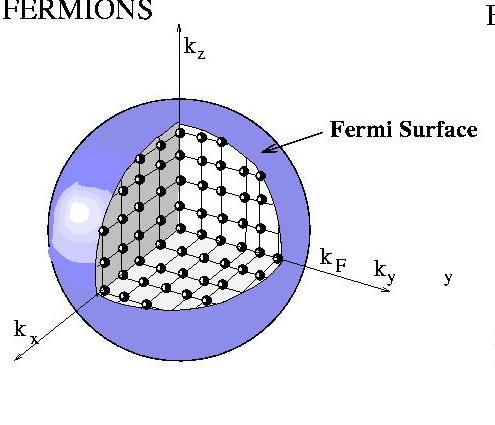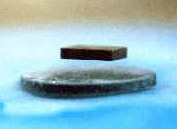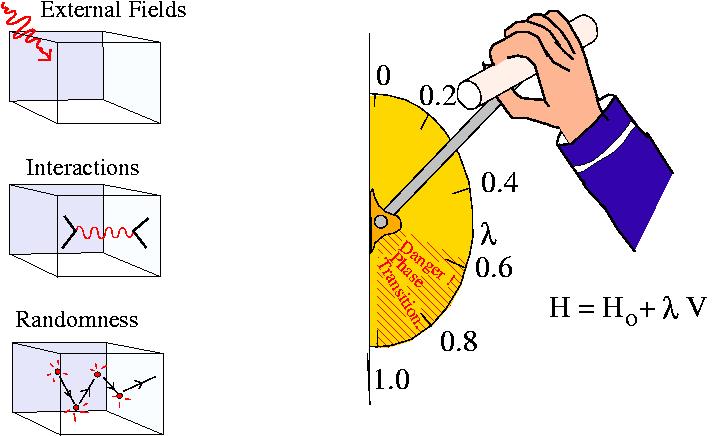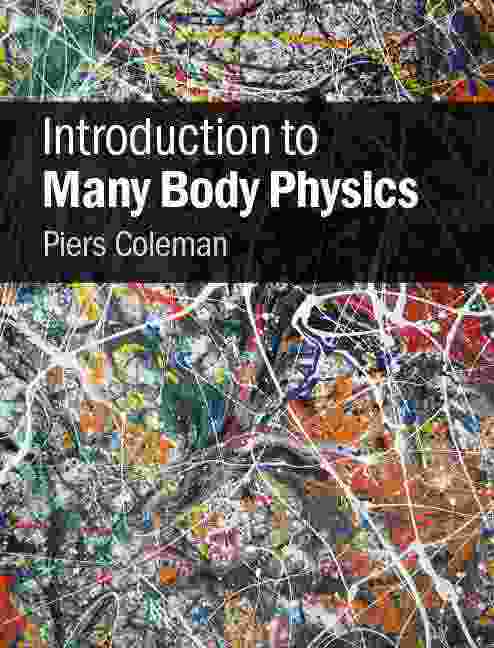10/7/13
Introduction to Many Body Physics.
620 Fall 2025
First day of class: Weds Sept 3rd 2025.
| Images | Monograph | Texts |
Exercises |
Times of Course |
Syllabus outline |
Timetable |
 |
 |
Maxwellian construction of a Fermi Surface |
Cuprate superconductor levitating a magnet. |
 |
 |
Quantum Critical Point: "Black hole" in the material phase diagram. |
Adiabatic concept: basis of perturbation theory. |
Instructor: Piers Coleman, Room 268
If you have any enquiries about this course or the
homework, please do not hesitate to contact me via email
at : coleman@physics.rutgers.edu
Scope of Course. Many body physics provides the
framework for understanding the collective behavior of
vast assemblies of interacting particles. This course
provides an introduction to this field, introducing you to
the main techniques and concepts, aiming to give you
first-hand experience in calculations and problem solving
using these methods.
Introduction to Many Body Physics.
The content of this course, with additional material will be my book "Introduction to Many Body Physics", published by Cambridge University Press and available as the adopted course book at the Rutgers Bookstore and also at Amazon.
 .
.
- Texts: Here are some other good references
for the course.
- Many-Particle Physics, Third Edition
by G. Mahan. (Plenum, 2000). A classic text on Many
body physics. Focuses on diagramatic and
Greens Functions method. Very thorough but a
little dated.
- Basic Notions in Condensed Matter Physics by P. W. Anderson. A classic reference. Many of us still turn to this book for inspiration, and philosophy. It also has a fine selection of important reprints at the back.
- ``Methods of Quantum Field Theory in Statistical Physics'' by Abrikosov, Gorkov and Dzyalozinskii. (Dover Paperback) - Classic text from the sixties, known usually as AGD.
- ``A guide to Feynman Diagrams in the
Many-Body problem by R. D. Mattuck. A light
introduction to the subject. Reprinted by Dover.
- ``Greens functions for Solid State Physics'' S.Doniach and E. H. Sondheimer. Not as thorough as AGD, but less threatening and somehow more manageable. Frontiers in Physics series no 44.
- ``Quantum Many Particle Systems'' by J. W. Negele and H. Orland. Alas all the good physics is in the unsolved excercises! However, it is the only one of this set to touch on the subject of functional integrals.
- R. Shankar, Rev Mod Phys 66 129 (1994). An amazingly self-contained review of the renormalization group and functional integral techniques written by one of the best expositors of condensed matter physics.
- ``Field Theories of Condensed Matter Physics'' by E. Fradkin. (Frontiers in Physics, Addison Wesley). Interesting material on the fractional statistics and the fractional quantum Hall effect.
- ``Quantum Field Theory in Condensed Matter Physics'' by A. Tsvelik. (Cambridge paper back) Very good for one dimensional systems. No exercises.
- The Theory of Quantum Liquids by D. Pines and P. Nozieres. Excellent introduction to Fermi liquid theory that avoids the use of field theory.
- Statistical Physics, vol II by Lifshitz and Pitaevskii. Pergammon. Marvellous book on applications of many body physics, mainly to condensed matter physics.
Traditional Many Body Theory and Greens Functions
Newer approaches to Many-Body Problem.
Further references:
Online
references (Check it
out- this is a great link).
Exercises 620 (Return to top)
Exercise 1 Solution to Ex 1.
Exercise 2 Solution to Ex 2.
Exercise 3 Solution to Ex 3.
Exercise 4 Solution to Ex 4.
Exercise 5 Solution to Ex 5.
Exercise 6
(Return to top) Note: this material is copywritten and should not be posted without permission.
2:00-3:20 pm on Monday and Wednesday in SRN-287 on Busch campus. Occasionally, to make up for my travel, we will hold an additional class at a time we have to determine. I apologize for this inconvenience.
Office hour: 9:50am Tuesday or by arrangement. Tel x 9033
Assessment: Assessment will be made on the basis of weekly assignments, a take-home mid-term and a take-home final exam. I want to encourage an interactive class and will take this into account when grading!
(Return to top)
Outline We will make a selected sortie through
the following list. Asterisks indicate areas that will be
high priority
- Second Quantization. ``Free'' systems-- the building block of the quasiparticle concept. *
- Phonons and photons, Fermi and Bose fluids; spin-systems (x-y) model. Interactions.*
- Green's Functions and Feynman diagrams .*
- Finite temperature Green Functions. *
- Application of Finite temperature Feynman
Diagrams to (i) electron-phonon problem * ; (ii)
transport theory.
- Functional Integral Approach (if time permits).
- Broken Symmetry and Superconductivity. *
(Return to top)
Schedule (Currently in evolution - please check back for final schedule) :
Week |
Monday 2:00 SRN 287 |
Weds 2:00pm SRN 287 |
Make-up class Friday 2:00pm SRN 287 |
1. Sept 1-5 |
No Class: Labor Day. | Fields
overview. Einsteins phonon: the Simple Harmonic Oscillator |
|
2 Sept 8-12 |
Collective Quantum Fields: 1 and 3D | Collective Quantum Fields: continuum and thermodynamic limit. | |
3 Sept 15-Sept 19 |
Conserved
Particles: Canonical Commutation Rules |
Interactions | |
| 4 Sept 22-Sept 26 |
Particles in
thermal equilibrium. |
Examples of 2nd
Quantization 1 D Antiferromagnet. Hubbard Model |
|
5 Sep 29- Oct 3 |
Examples
of 2nd Quantization Jordan Wigner Transformation, 1D Ferromagnet. |
Examples
of 2nd Quantization Free Bosons, Fermions |
Examples of 2nd Quantization: Boltzmann Density Matrix |
6. Oct 6- 10 |
Greens
Functions: Generating function for bosons |
Greens
Functions: Free Fermions and Bosons |
|
7. Oct 13 - 17 |
No
Class: on Travel |
No Class: on Travel | |
8. Oct 20- 24 |
Generating function for Fermions. Spectral decomposition. | Adiabaticity Gell-Mann Low Theorem |
|
9. Oct 27- 31 |
Landau
Fermi Liquid Theory |
On
Travel |
T=0 Feynman Rules Linked Cluster Theorem |
10. Nov 3- 7 |
T=0 Feynman diagrams: Heuristic derivation |
T=0 Electron in scattering potential. Hartree Fock. |
|
11. Nov 10 - 14 |
More Mr Feynman | Response functions. Lindhard Function. | |
12. Nov 17 -Nov 21 |
RPA
Approach. Large N electron gas |
Finite
T Imaginary time Greens functions |
|
13. Nov 24 - Nov 28 |
Finite
T Feynman Rules and examples |
Finite
T: Electron Phonon interaction: self energy; Migdal's theorem. Since this is technically a Rutgers "Friday", this will be a kind of make-up class. |
|
14. Dec 1 - Dec 5 |
Superconductivity Preliminaries | Superconductivity BCS Theory I | Superconductivity
BCS Theory II |
| 15. Dec 8 -
Dec 12 |
BCS III |
BCS Meissner Effect |
Superconductivity
Roundup. |
(Return to top)